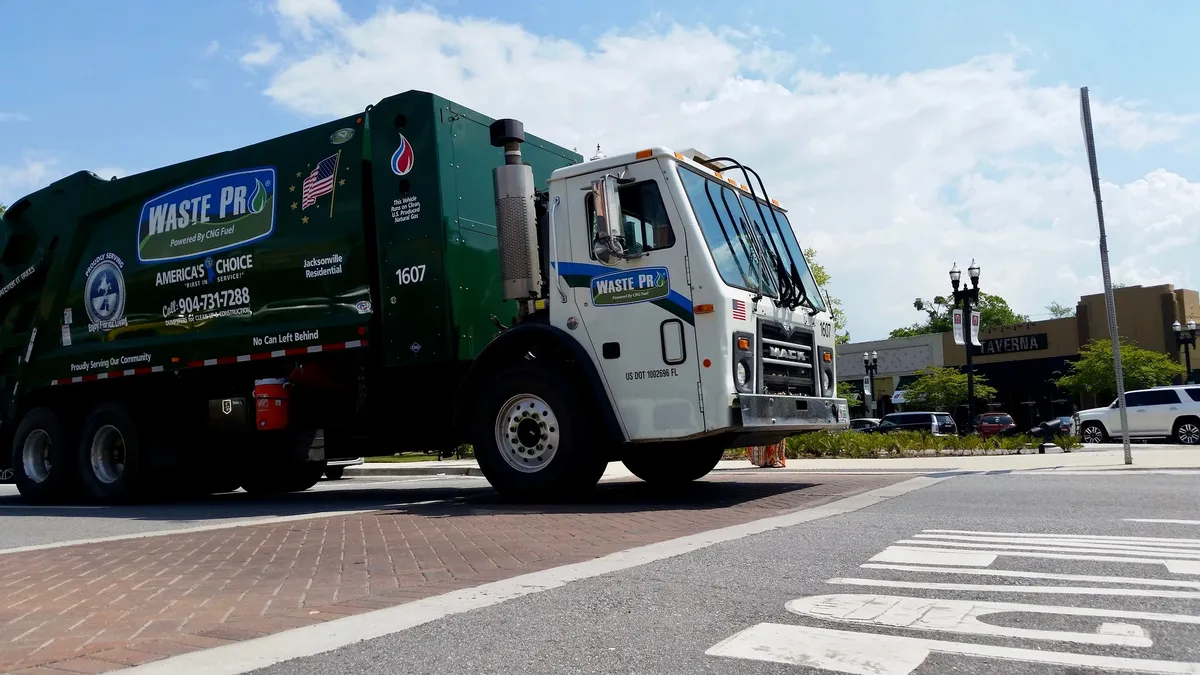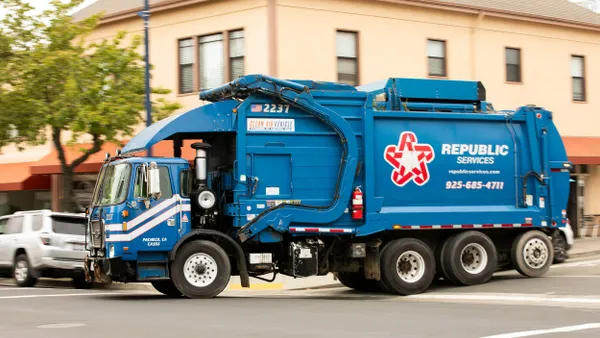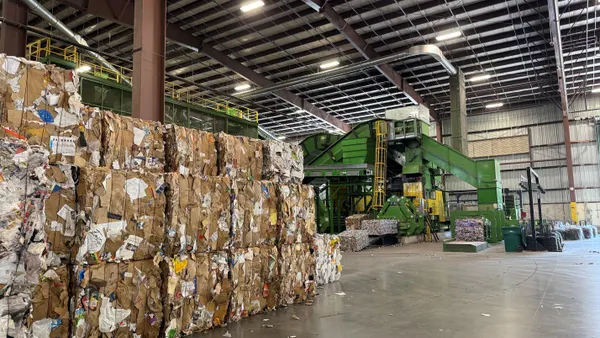Waste Pro's recent elevation of Sean Jennings to CEO and Keith Banasiak to COO marks the latest in a series of parallel moves for the two executives and a new chapter for the Florida-based private company.
Banasiak joined Waste Pro in 2005, shortly after it was founded by John Jennings, and brought a long industry track record. Previously, at a large publicly-traded company, Banasiak said he was sometimes "relegated to drive to a number" for shareholders at the expense of customer service. Under the "Waste Pro Way," he said, if you "have the right people, have the right equipment and have the right process all those numbers are going to fall into place."
Previously, Banasiak was promoted to senior vice president in 2019 and spent multiple years working alongside Sean Jennings in Florida. After the younger Jennings got a year of frontline experience in Costa Rica on a truck and at a landfill, he joined the family business to learn about subscription routes, municipal contracts, facility construction and more. Now, as John Jennings steps into an executive chairman role, the new CEO and COO are part of a team leading a company with more than $700 million in annual revenue and operations across 10 states.
The following interview has been edited and annotated.
WASTE DIVE: How should the industry think about what this means for Waste Pro? Is a new generation now running the company?
KEITH BANASIAK: It's really exciting. Sean and I work together daily ... so the natural progression to get Sean into that position and me to follow suit made sense. When I look at people they say "congratulations, Keith, what are you going to do? [The job] is a whole lot different." I look at them and I say, "It's not different. It's what I do every day." The only difference is it's on a bigger scale.
We're going to take some of the best practices from the Southwest Florida region and we're going to employ them in other regions. And we're going to find things in other regions and we're going to employ them there.
We're going to be visible. We're not going to be behind desks, looking at numbers, requesting information from locations ... I plan on being in the field. I'm a guy that wears jeans and a pair of boots. Very seldom will you see Keith wearing a business suit, it just doesn't happen.
Banasiak goes on to say the company's size of approximately 4,000 employees makes it possible for executive leadership to still personally know local leaders, and some frontline workers, across every location.
I feel, and Sean feels the same way, that by us being visible we're going to drive improvements and they're just going to come natural ... By the second week of September, we will have seen every facility, including landfills and transfer stations.
How is your team holding up during the COVID-19 pandemic?
BANASIAK: We're doing good ... These guys on the front lines, they have it difficult. Now you take COVID on as an additional hazard and it's really kind of changed the complexity of their position. Our first and foremost priority, from the top down, is to make sure that our employees are safe.
When that first outbreak happened, it was kind of good in the sense that it was spread across our footprint and it was very minimal and we felt really blessed that we weren't impacted as much. Now, the resurgence has been very challenging ... Waste Pro is a Southeast United States company and that's a lot of where the hotspots have been. So we've had to try to at least maintain head count, where in the past we want to be above head count.
So we've had to step up our recruiting locally and at the corporate office to try to make sure we're filling these positions. We've had to work with temp staffing agencies closer to try to make sure that they had people available for us. Retention becomes a struggle in areas with high COVID rates.
You talk about Miami, talk about Atlanta, places like that. People are getting tested, they're finding out that they could be positive, or are positive, or not feeling good and they're staying out. Now that's revolving, because once they come clear they're back in. But really through this rotating head count reduction it's as much as 2% to 3% down in some areas, which has caused us to get creative in how we pick the trash up.
I've talked to cities and counties and we have a great plan in place when it comes to hurricane preparedness. Nobody ever thought to prepare for a pandemic and what does that mean? Cities and municipalities don't want to hear it ... Some just don't want to face the fact that the garbage company could be at 50% of capacity if COVID runs through a facility.
Other companies have talked about revisiting their agreements as residential weights may stay above average near term. Does now feel like the time to have those contract discussions?
BANASIAK: We're going to wait on it. Waste Pro has never been the company to jump in the front and pull the force majeure of a contract. We've been the company that would rather work with a municipality and try to weather the storm together. But I have to tell you, some municipalities have really challenged us to the point where you get pushed and pushed and at some point in time something's got to give.
What's interesting though is those same municipalities have departments that they operate that have been shut down because of COVID. But for some reason, they don't think it can happen to their garbage hauler. [I think] they don't want to have to tell elected officials that we can't provide services.
So maybe we reduce and combine recycling [or yard waste] with garbage, which a lot of times seems to make the most sense, especially in Southeast U.S. ... [This] allows us to use the extra resources to make sure we're picking that up.
But boy, does that come with a lot of opposition. And when you sit with these folks and explain to them, it's like, something has to give, what do you want it to be? So I think there has to be some improvements in contracts going forward ... What we're doing is we're sitting back and waiting and seeing what others are doing and we'll choose our own path based on what we see.
Other companies have also been calling out changes in capital expenditures due to the pandemic. Is that trend happening at Waste Pro?
BANASIAK: Oh absolutely ... One of the things we've done within the Waste Pro Way is how we maintain our image, whether it's branding on trucks or containers, and especially our facilities. Each year, there's a portion of capital that's outlaid for facility maintenance and appearance.
So we've looked at those and said "okay, we're going to have to pump the brakes unless it's producing revenue." So as an example, would we want to add a bay to a transfer station? That's going to produce revenue. We just completed a new cell on a landfill. Of course that's going to produce revenue.
Banasiak raises the company's refurbishment shops as another way to maximize capital spending. This can involve a range of combinations between different bodies, chassis and other components.
We have three really successful refurb shops that are operating and producing some really good quality product ... We're going through everything from engine and [transmission], we'll do the health diagnostics on it, we're freshening up the cab so the driver has a good experience. We just don't want to put paint on the outside and say, "this thing's refurbed." We want to make sure that when it hits the street, we have no problem with it. And our success ratio has gone up dramatically in the past year with regards to our refurbs that are coming out.
Banasiak says fleet standardization is also an ongoing priority, as well as experimenting with alternative fuel vehicles and other sustainability initiatives.
I'd say I was the first one to buy a hybrid clamshell truck in the country, and it was an electric, back in 2007. I believe I was the first one [in the industry] to put solar panels on buildings. We bought 10 hydraulic hybrid trucks that we put in one of our sites. And that was really a great move to reduce diesel consumption by 50%.
Do you expect any new alternative fuel investments near term?
BANASIAK: Just continued CNG. In fact, some of the refurb plans have CNG chassis and used bodies. So that continues along. We just finished the expansion in Jacksonville, so our fueling capacity is greater. We're in the process of doing the same thing in Sarasota.
[For electric vehicles] let's let somebody else try that one for a little bit. We'll see how it worked out, because I don't know if we're ready to go down that road yet.
Banasiak also raises Waste Pro's recent announcement it would be the first to buy Autocar's new ACX severe duty cabover model as a sign of ongoing fleet investment. The trucks will include many automated safety features common in passenger vehicles that have long been sought by the industry.
If we can get chassis that are safer for our drivers, safer for our constituents on the street, that's what we want to do. For '21, I would say that's the first and foremost thing that we'll be doing in addition to just standard CNG purchases.
A lot of this feels like areas we'd see in an environmental, social and governance (ESG) report. Is that on your horizon, to formalize the work with defined reporting standards and targets for the future?
BANASIAK: Yeah. I actually have been leaning on Sean on this one a little bit. Sean has really been the one that has looked at ESG reporting and any sustainability goals that we might have.
In addition to reiterating prior hybrid truck purchases, Banasiak goes on to discuss efforts to recycle coolant and use telemetry to make routing more efficient, which in turn can reduce emissions.
Another area that often comes up in ESG reporting is diversity and inclusion. What has this work looked like for Waste Pro in the past and is there anything new on your radar given everything that has happened this summer?
BANASIAK: No, I think more than anything, we've always tried to be a fair and equitable employer. The culture that we created within the Waste Pro Way tries to be welcoming and includes everybody. So I don't think there's much change there.
What has changed is that over the past several years, our Co-Heart Program is really I think where we've stepped up and gained an edge on our competitors. If you're a helper and you want to get your [commercial driver's] license, we don't care who you are, we don't care what your race is. We will help you get your license and we'll provide that mentoring ... We work with them with our supervisors – and we train our supervisors on how to properly train these employees – to be able to qualify to get their license.
So that helps us in the field, but it also gives the opportunity for folks that may not have the money available to get their license, to be able to do it.
Banasiak also confirms a recruitment pilot with the Florida Department of Corrections remains ongoing.
Are you finding that people are able, if they want, to then move up to supervisory or management levels? Are there any kind of barriers you've identified?
BANASIAK: Yeah, the interesting thing is not all drivers want to be supervisors. Some of our best drivers just want to drive, they don't want to have that responsibility. And then we've found others successfully that have made their way up to operations management.
Banasiak notes one such employee he calls on "quite frequently" to assess locations and provide additional training. He describes this as part of a broader emphasis on training to ensure all employees are well prepared to grow into new roles.
In 2019, we did add a trainer at our corporate level. And the idea there was to really help strengthen the skills of our route managers and our managers in general. That allows them to really focus on effective employee coaching and retention. You can go through with an employee and follow the rule book and you can run somebody out pretty quick, but some people just need coaching.
Are there any highlights to call out from recent acquisitions as part of Waste Pro's broader strategy?
Waste Pro's latest deals included assets across Florida, Georgia and Mississippi.
BANASIAK: [W]e're not a company that's going to purchase just to grow revenue. Waste Pro's intent is not to build revenue to make a stockholder happy. Waste Pro's role on growth is controlled growth, growth that is profitable. Most importantly, when we're doing an acquisition we want to make sure it's a business that fits the Waste Pro Way. We're not going to go purchase a company that has a poor reputation for service and then try to go in and correct it.
Sure, we can go into different markets – and we get calls all the time outside of our advertised footprint to come in and to take a look at this opportunity – and that's just not us. We've got capital available. Last I checked, we had over $100 million available for M&A opportunities. When we did our last bond offering we were oversold by multiples of what we were asking for. So we could probably go out in the bond market and gain a half billion dollars. But we're trying to be controlled as to what we do.
In the future, do you anticipate mainly doing more tuck-ins or could you do anything bigger?
BANASIAK: We are looking at both. There's some opportunities [for us] in different markets in a large way, turnkey if you will. But then we will always be looking at our tuck-ins for sure.
What else is next for Waste Pro in the coming years?
BANASIAK: John has always used this term, the "distinguishable difference," and that falls into us being who we are and what we do by following the Waste Pro Way or the culture that he's established for us.
The business isn't hard. It's trucks and it's people and that's really it. If you maintain trucks and you hire the right people, and good people, it's easy to operate a location. So that's going to be our focus and that's really what I see as far as how we change the future. I think visibility and transparency between us and the field is the key.












